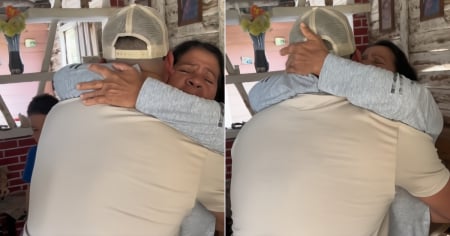An emotional video shared on TikTok by user @lea93108 has moved thousands of people by showing how parents in the United States sent their young daughter alone to Cuba so she could meet her grandparents and other family members.
The video, which has already garnered thousands of views, captures the moment when the baby is joyfully welcomed at the airport by her grandmother and other family members.
In the clip, the grandmother can be heard excitedly hugging and kissing the little girl, saying, “Oh, what a sweet granddaughter I have!” The images capture the warm welcome that the Cuban family extended to the child, transforming what could have been a distressing experience into a joyful reunion filled with love.
The baby's mother, who cannot travel to the Island due to her I-220A immigration status, explained in the post: "I am I-220A and her father is a political asylee; we cannot go to Cuba, but we send our most precious treasure."
These words reflect the challenging situation faced by many Cuban families divided between the United States and Cuba due to political, migration, and economic reasons.
The case reflects a common reality among Cuban families living abroad, who often face obstacles in family reunions due to migration restrictions. In this instance, the girl's parents decided to send her alone to Cuba so she wouldn't lose her connection with her roots and loved ones.
The I-220A status is a category of immigration supervision granted to certain individuals who are undergoing legal processes in the United States, restricting their ability to travel abroad. For their part, political asylum seekers cannot return to Cuba without losing their immigration benefits, which further complicates the situation for separated families.
This gesture from the parents, who named their daughter their "most precious treasure," highlights the difficult decisions that many Cubans in the diaspora must make to maintain family ties while facing the challenges of their legal situation.
The touching moment of the baby's arrival in Cuba serves as a reminder of the importance of family for Cubans, even in the most complex situations.
Frequently Asked Questions about Family Reunification and the Immigration Status of Cubans in the United States
Why do some Cuban parents send their children to Cuba alone?
Some Cuban parents send their children to Cuba alone to maintain family and cultural ties. Due to immigration restrictions and complex legal situations in the United States, such as I-220A status, many parents are unable to travel to the island and choose to send their children so they can meet their grandparents and other relatives.
What is the I-220A immigration status and how does it affect Cubans?
The I-220A status is a document of probation that allows migrants to remain in the United States while their immigration situation is being decided. For many Cubans, it represents a legal limbo, as it does not permit them to obtain permanent residency or return to Cuba without risks, complicating their situation and that of their families.
How does family separation affect Cuban emigrants?
Family separation has a profound emotional impact on Cuban emigrants, who often experience nostalgia, sadness, and anxiety. Immigration restrictions and prolonged separations intensify these feelings, especially during holidays and significant family moments.
How do remittances from Cubans abroad help their families on the island?
Remittances sent by Cubans abroad are a crucial lifeline for many families in Cuba. These transfers help cover basic needs such as food and medicine in a context of economic scarcity within the country, and represent a significant sacrifice from those who send them.
What challenges do Cubans with I-220B status face in the United States?
Cubans with I-220B status face challenges such as the threat of deportation, legal uncertainty, and a lack of access to permanent residency. This situation becomes even more complicated for those with families to support, as detention or deportation directly impacts the stability of their loved ones.
Filed under:
